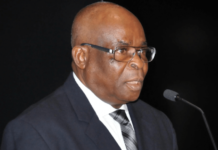Speaking on the allocations to the three tiers of government, some finance and economic experts said that while the country had been badly hit by the decline in oil production and revenue as a result of the activities of militants in the Niger Delta, there were a lot of untapped resources at the states, which could be developed for economic prosperity.

Those who spoke on the issue were the Head of Banking and Finance Department, Nasarawa State University, Keffi, Uche Uwaleke; a former Managing Director of Unity Bank Plc, Mr. Rislanudeen Muhammed; and a former Managing Director, Nigeria Deposit Insurance Corporation, Mr. Ganiyu Ogunleye.
Mr Uwaleke, an Associate Professor of Finance, told our correspondent that diversification of the economy would help address the socioeconomic challenges facing the country, adding that once the federating units were given the powers to control their resources, it would help promote competition.
He said with competition, the federating units would come up with innovative ways of stimulating their respective economies.
Mr Uwaleke said, “Restructuring is the panacea for many of the socioeconomic challenges facing the country. This much came to the fore in the last national conference put together by the previous administration.
“The seemingly endless crises in the Niger Delta region will substantially abate if the country is restructured in a way that allows greater control of resources by the federating units. The present economic recession is a direct consequence of the drastic fall in government revenue, which has been blamed in part on militancy in the Niger Delta.”
In his comments, Muhammed said there was a need to come up with initiatives that would make all the states compete for economic development.
He stated, “Nigeria has huge economic potential outside the oil sector, which are largely untapped due to the so called Dutch Disease that has for years made us lazy and always relying on mono product commodity called oil as a source of income, notwithstanding the fact that oil constitutes only 10 per cent of our Gross Domestic Product.
“Economic restructuring will make all the states compete for development and uplifting the lives of their people. There are potential for growth in non-oil export in most states, and virtually all the states have one form of economic competitive advantage or the other.”
Ogunleye, on his part, said there was a need to diversify the economy, as it held the key to the economic development of the people.
He stated, “Restructuring is a necessity and I think that is what people have been advocating over the years, but the challenge is that it is either there is no serious commitment to it or the political will to implement it is lacking.
“Otherwise, when you talk about diversification, it’s almost the same thing as restructuring the economy.
Over the years, we relied on oil revenue and now we can appreciate the risks of relying on one source of revenue.
“We are not a manufacturing country and so most of the things we use in this country are imported, so certainly there is a need to restructure the country in such a way that we can develop manufacturing capacity.”
Business Day











